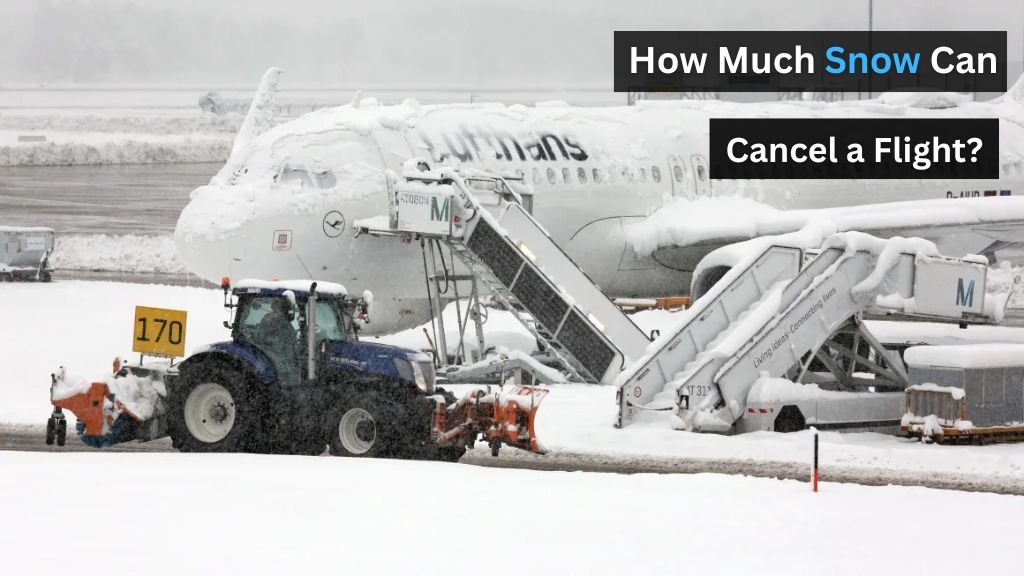Snow weather can be a big challenge for air travel, leading to delays and cancellations. However, there isn’t a specific amount of snow that automatically cancels a flight. Many airports and airlines have systems in place to handle winter weather, but other factors like visibility, wind, and ice play a big role in determining whether a flight can safely take off or land.
How Much Snow is Too Much for Flights?
The amount of snow that cancels a flight depends on various factors, including the airport’s snow-handling capabilities, aircraft de-icing procedures, and overall weather conditions. Major airports in snowy regions, such as Chicago O’Hare or Denver International, are equipped to handle over a foot of snow with efficient plowing, heated runways, and de-icing systems. In contrast, smaller airports with limited snow removal resources may struggle with just a few inches, leading to delays or cancellations. While snowfall itself is manageable, other factors like icy runways, strong winds, and reduced visibility can make flying unsafe, forcing airlines to cancel flights. In general, light snow may only cause minor delays, but heavy snowfall combined with poor conditions can lead to widespread disruptions.
Key Factors to Flight Cancellations
Flight cancellations during snowy weather happen for several reasons. Heavy snowfall and poor visibility make it hard for pilots to see the runway, which can delay or cancel flights. Icy runways are another big issue—if they become too slippery, planes cannot take off or land safely. Strong winds and blizzards can also make flying dangerous, even if the snowfall is light. The size of the airport matters too. Large international airports have better snow removal systems, so they can handle heavy snow, while smaller airports may struggle with just a few inches, leading to more cancellations.
What to Do If Your Flight Gets Canceled Due to Snow
If your flight gets canceled due to snow, the first thing you should do is check for updates through your airline’s website or mobile app. Most airlines provide real-time notifications about delays and cancellations, along with rebooking options. Many airlines allow passengers to rebook on the next available flight for free or offer refunds for weather-related cancellations. If you’re traveling during winter, having travel insurance can be a lifesaver—it may cover hotel stays, rebooking fees, and other unexpected expenses. To avoid cancellations in the first place, consider booking early morning flights, as they are less likely to be affected by delays. Choosing airports with better winter weather management and allowing extra travel time can also help you navigate winter travel disruptions more smoothly.
How Airlines and Airports Handle Snow
Airlines and airports have well-planned strategies to keep flights running smoothly during snowy weather. Major airports in colder regions use advanced snow removal equipment like plows, blowers, and even heated runways to clear snow quickly and prevent disruptions. A key part of winter operations is aircraft de-icing, where planes are sprayed with anti-icing fluids to stop ice buildup on wings and ensure a safe takeoff. Air traffic control also plays a crucial role, constantly monitoring weather conditions and adjusting flight schedules to reduce delays and cancellations. Many large airports have dedicated winter operations teams working around the clock to manage heavy snowfall and icy conditions. However, smaller airports with fewer resources may struggle more, leading to longer delays or cancellations during severe winter storms.
Frequently Asked Questions
How many inches of snow can cancel a flight?
There is no fixed amount of snow that cancels a flight. Large airports can handle over a foot of snow, while smaller airports may struggle with just a few inches. Other factors like visibility, ice, and wind also play a role.
Can planes take off in heavy snow?
Yes, planes can take off in snow if the runways are cleared and the aircraft is properly de-iced. However, if conditions become too dangerous, flights may be delayed or canceled.
What happens if my flight is canceled due to snow?
If your flight is canceled, airlines usually offer free rebooking on the next available flight. You can also request a refund, depending on the airline’s policy.
Does travel insurance cover flight cancellations due to snow?
Many travel insurance policies cover cancellations, rebooking fees, and additional expenses like hotel stays if a flight is canceled due to snow.
What is the best weather for snow to avoid flight cancellations?
Light snowfall with minimal wind and clear visibility is ideal for flights to operate with low chances of cancellation. Airports can handle snow efficiently as long as it doesn’t accumulate too quickly or cause icy conditions.
How can I avoid flight cancellations in winter?
Book early morning flights, choose larger airports with good winter infrastructure, and check the weather forecast before traveling. Travel insurance can also help if cancellations occur.
